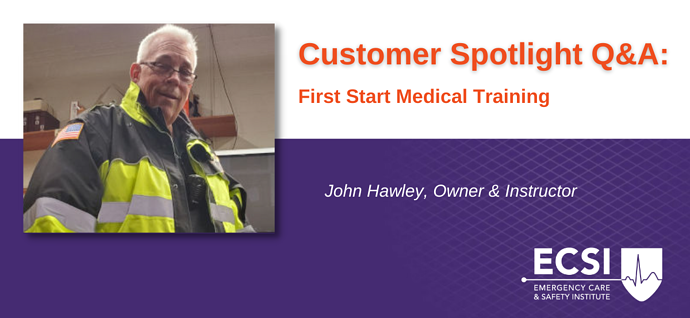As part of the ECSI Customer Spotlight series, we had the chance to speak with John Hawley, Owner & Instructor of First Start Medical Training. In this Spotlight, Hawley shares his experience using ECSI products in his basic life support and first aid training courses.
Overview
John Hawley is the owner of First Start Medical Training in Belchertown, MA. He's been teaching emergency care classes since 1977 and has been associated with the Emergency Care & Safety Institute (ECSI) for nearly 20 years. John is a certified Paramedic who offers basic life support and first aid training for many daycares in Massachusetts, who need to be trained annually, as well as other organizations per request.
What initially led you to considering ECSI for your classes?
Due to some inflexibility and high costs in the American Heart and Red Cross training programs, I found myself looking at ECSI while I was serving on an advisory committee for Massachusetts Police Criminal Justice Training. It was easy to get my training center set up and I've largely only used ECSI since then, except in rare scenarios where I am forced to use American Heart based on customer demand. Your books are easy to acquire and less expensive than the competition, and I like how easy it is to share the course completion cards with students once they've completed their training. The pamphlet book that accompanies the larger First Aid book is also great; I mainly use that since it's easier to carry and more condensed for student use.
What sets ECSI training apart from the competition?
Outside of the lower price and ease of use, I like the way the ECSI videos and skill sheets are set up. I can bring my laptop to training sites and use a little portable pocket projector to show the videos and skills on the wall for my classes. Your videos are also a lot more relevant to care "on the streets." A lot of the American Heart videos show emergency care being delivered in hospitals rather than outside or within a daycare, community center, and more.
Do you have any stories of student saves you could share?
I got a call from a mother about six months ago. I trained the team at the daycare she owns, and she had included her older son in the training because she wanted him to know how to perform CPR and other emergency care techniques in case of an emergency. It turns out that her younger child started choking on some food at home, and the older child was able to save him using the Heimlich manuever. She wanted to let me know that my training helped save one of her kids.
During the COVID-19 pandemic, have you found any unique ways to continue your training while keeping your students safe?
My classes have had no more than 10 people and 12 mannequins. I require that adequate spacing be available for classes as well. Most of the training I deliver is recertifications, so
I generally don’t do any breathing exercises, which allows students to keep their masks on; I focus largely on compression. For practice applying band aids or wrapping an arm, I’ll use something like the arm of a chair. I am also very
keen about mask wearing and wiping off mannequins after every use. So far, I have not encountered any issues.
What advice would you give existing ECSI Education Centers and Instructors on how to be the most effective in providing emergency care training to their communities?
You need to know your audience, whether it’s a daycare, a group of people who just want to learn emergency care techniques, firefighters, or others. Each audience has different needs in their training, so make sure you take the time to understand what they want out of their training. This way, you can tailor the training to their specific needs and ensure everyone is satisfied to the best of your abilities.
Any closing words you’d like to share with people considering using ECSI for emergency care training?
I would tell them to research the different emergency care programs because they’ll likely find that ECSI is the best one to deal with and their prices are good.
For more information about training with ECSI, please visit our website today.
